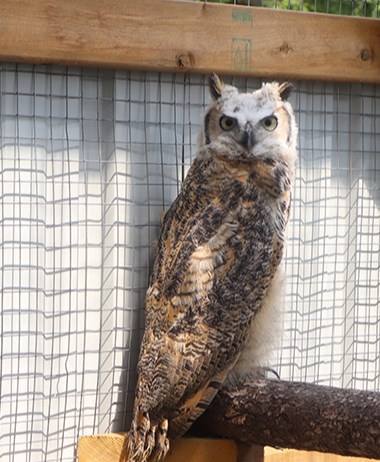CANORA - Open since last November, activity is gradually on the increase at the Majestic Raptor Rehab facility in Canora.
“We take sick, injured or orphaned birds of prey (raptors) and work with them toward the goal of releasing them back to the wild,” said owner Mary Huebert.
At the time of a July 4 visit with Canora Courier there were four birds rehabbing at the facility. But they have room for many more, about 30 birds in the outdoor enclosures as well as 42 inside cages that are built for one bird each.
“All four birds presently with us came from Silverwood Wildlife Rehab near Whitewood because the owners had a medical emergency and were no longer to look after them.”
A female great horned owl is one of the three birds presently in the outdoor flight pens, and has been here since June 1.
“It was an orphaned baby, covered with down and only a few feathers,” said Huebert. “The down is all gone now; it’s a sleek, beautiful bird with plenty of feathers.”
The owl has gained weight well and weighed in at 1.3 kg at a recent weigh-in. It will be kept here over the winter, plans are to release it in spring. Parents usually spend about a year with baby owls like this one, teaching them hunting skills.
Huebert is planning to build a live feeding enclosure about 50 feet long, 16 feet high and 20 feet wide and utilize it to teach juvenile birds such as this one how to hunt.
“It will be stocked with live mice in a pit, giving the birds an opportunity to learn to dive down and catch them,” said Huebert. “We’ll build it with rooms on the end, so daytime and nighttime hunting birds can be alternated in their hunting education.”
Klondike, a mature bald eagle, has been at Majestic Raptor Rehab since May 19, and had already been named when it arrived. It was originally found near Melville with a dislocated right wing elbow and torn ligaments.
“She has progressed to the point where she’s using her wings, but Klondike can’t gain any height for flying yet,” said Huebert
She has made plenty of progress since spending her first month at Silverwood Wildlife Rehab in a kennel to prevent her from using her wings during the healing process.
“Her wings are even now, earlier her right wing was up more,” said Huebert.
Dr. Richard Harris of Preeceville has been in to take a look at her, as he does with all the birds at Majestic Raptor Rehab.
“He oversees everything here. We can’t operate without him,” said Huebert.
The third bird presently housed in the outdoor facility is a red-tailed hawk.
“She was found in the Melville area after being electrocuted, and had been at Silverwood Rehab since last September. She had lost all her feathers, but is getting the feathers back. Now we need to see her fly,” said Huebert.
These birds usually migrate in October, so “if she doesn’t fly by September she may have to stay the winter.”
The hawk definitely has a good appetite. Huebert said she’s up to eating 13 mice per day.
The only bird presently indoors is a merlin, and no, it’s not a magician.
According to allaboutbirds.org merlins are small falcons with a powerful build. They are fierce, energetic predators that patrol shorelines and open areas looking for their prey.
Huebert said merlins have a reputation for quick learning, especially when it comes to flying and hunting.
This merlin was found out of its nest with the eyes sealed shut and scabbed.
“It was like it had a white cloud over its eyes.”
Being a hunter, the merlin definitely needs its eyesight. Huebert has been working with the University of Saskatchewan small animal clinic in looking after it.
She is anticipating the arrival soon of a baby great horned owl with a leg fracture, after the leg was first aligned at the U of S. It has also spent time at Living Sky Rehab in Saskatoon. Huebert said this is another bird that would benefit greatly from a live feeding enclosure.
In the near future, Huebert would like to open her license to what is known as a multiples license, which would allow her to take in more birds such as ravens and crows, as well as small animals including rabbits and raccoons.
Huebert urges anyone who finds an injured bird of prey (raptor) to bring it in to Majestic Raptor Rehab or give her a call at 306-563-7252.
Don't count on social media to deliver your local news to you. Keep your news a touch away by bookmarking Canora Courier's homepage at this link.
Bookmark SASKTODAY.ca, Saskatchewan's home page, at this link.




